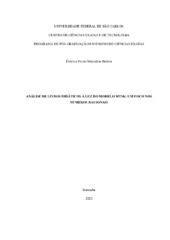Análise de livros didáticos à luz do modelo MTSK: um foco nos números racionais
Resumo
This dissertation brings an analysis of two 6th grade mathematics textbooks, which were
validated in the last three years of the National Book and Didactic Material Program (2014,
2017 and 2020). The analysis consisted of raising, using a qualitative methodology of a
documental nature, which specialized knowledge for the teaching of rational numbers were
presented by the authors. As a parameter for the analyses, research was used whose results
sought to identify the mobilization of the teacher's specialized knowledge for the teaching of
rational numbers from the MKT model (Mathematical Knowledge for Teaching), by Ball,
Thames and Phelps (2008) and the PCK, by Shulman (1987), and the results of these surveys
formed a knowledge base for the analysis of textbooks. For the categorization of the
specialized knowledge present in the works, the model of Specialized Knowledge of
Mathematics Teachers (or of Teachers who Teach Mathematics), the MTSK (Mathematics
Teachers' Specialized Knowledge) by Carrillo et al (2013), was used.The data presented in the
analyzes indicate an emphasis on the part of the authors in the development of specialized
knowledge in the “phenomenological” and “representational” aspects, with emphasis on
Araribá Mais Mathematica in the latter scope. However, a relevant number of gaps was
highlighted regarding aspects of “definitions and image of a concept” and “associated
meanings” in both books. It was also possible to verify that both books demonstrate
specialized knowledge for teaching in terms of “auxiliary connections” and “validation
modes”, all of which are related to mathematical knowledge. With regard to didactic
knowledge of the content, the data in the analyzes indicate that both books present specialized
knowledge in the scopes "ways of presenting the content - learning potential", "associated
pedagogical resource/material", with greater evidence of presence of knowledge of the scope
“psychological theory associated with the learning of content” in the book Teláris
Mathematica. With regard to the "most common learning errors", both books stood out for the
high manifestation of specialized knowledge in contrast to low gaps.
Collections
Os arquivos de licença a seguir estão associados a este item:

